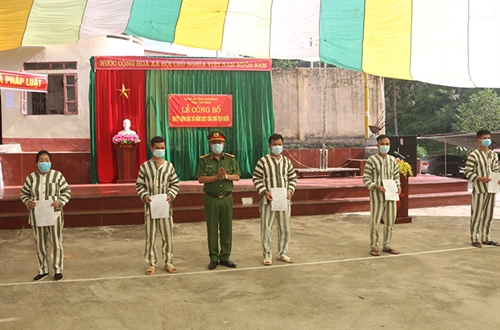Ha Le Thuy, LL. D., and Tran Cong Thiet
Law School of the Hue University
Environmental pollution has not only caused damage to property and human health and life but also exerted great adverse impacts on the national economy. Criminal laws of Vietnam contain provisions on handling on legal persons’ acts of polluting the environment, covering the examination of their penal liability.
Vietnam’s criminal law on penal liability of legal persons for polluting acts
The 2015 Penal Code (revised in 2017) (the Code) recognizes for the first time legal persons as subjects that can be held criminally liable for their offenses. This is a breakthrough in Vietnam’s criminal policies which concretize the Communist Party of Vietnam’s resolutions concerning criminal justice and the 2013 Constitution and aims at giving more teeth to the Code in the crime prevention and combat and significantly changing the traditional awareness about crimes and penalties. The Code states: “Only commercial legal persons that commit the crimes prescribed in Article 76 of this Code shall bear penal liability therefor.”[2] In other words, only commercial legal persons that commit certain crimes will be criminally charged and prosecuted.
Having provided for penal liability of legal persons, the Code specifies crimes for which corporate offenders may bear penal liability, including the crime of polluting the environment[3], so long as their acts constitute a crime. Compared to previous provisions on this crime, the Code’s provisions on environmental crime constituents specifically describe acts and quantify specific violations and consequences they must face. Particularly for the crime of polluting the environment, the Code provides an exhaustive list of acts of polluting the environment, including illegally burying, filling, dumping or discharging into the environment hazardous wastes, persistent organic pollutants or solid wastes, discharging into the environment wastewater, or emitting into the environment radiations or radioactive materials, and elements causing environmental consequences. These provisions have created a legal ground for handling polluting acts, contributing to the prevention and combat of polluting acts and meeting international integration requirements.
As per the Code, commercial legal persons committing an offense of polluting the environment will face a fine or suspension from operation for between six months and two years and additional penalties including ban from doing business or operating in certain areas for between one and three years. In addition, they will have to pay compensation for any damage caused by their polluting activities.
 |
The branch of Thuan Phat Steel Import-Export JSC. in Dong Nai province is caught in the act of illegally discharging hazardous wastes into the environment__Photo: VNA |
| The branch of Thuan Phat Steel Import-Export JSC. in Dong Nai province is caught in the act of illegally discharging hazardous wastes into the environment__Photo: VNA |
For criminal acts polluting the environment in particular and environmental crimes in general, their consequences are regarded as a compulsory sign for crime. Offenders in most cases cause certain damage to individuals, institutions or the society. That’s why the Code compels damage-causing offenders to remedy consequences of their acts by paying compensation for economic and mental damage to suffering parties. In most cases of environmental pollution, offenders cause damage to human health and property. On principle, damage-suffering parties are obliged to prove damage inflicted on them and the level of compensation will correspond to the extent of actual damage. Nevertheless, this principle may only be applied to cases eligible for compensation for economic damage since mental damage is usually intangible and unquantifiable and can hardly be proven.
To date, since the introduction of regulations on penal liability of corporate offenders, no commercial legal persons have been punished according to the criminal procedure for polluting the environment, despite the fact that polluting acts can be seen occurring frequently in many provinces and cities nationwide. In our opinion, there are two major reasons for this reality.
The first reason is that, in most cases, it is very difficult to determine the damage caused by polluting activities. In order to do so, proceeding-conducting bodies have to rely on specialized organizations to carry out damage assessment which is costly and time-consuming but still cannot guarantee accurate calculation of damage amounts in certain cases. Some environmental pollution incidents do not directly cause immediate tangible consequences but only cause adverse impacts on future generations. Meanwhile, the current criminal law only accepts victims’ claims for damage compensation when real tangible damage is caused and can be proven. In fact, those who are impacted by polluting acts, mainly suburban and rural residents, can hardly meet the above requirement in order to claim compensation.
The second reason is that the legally established procedures for performing the obligation of proving damage remain inflexible, making it difficult to determine the actual damage and examine the penal liability of corporate polluters.
Solutions
In order to determine damage caused by polluting acts of corporate offenders and concurrently examine their penal liability for such acts, the following solutions should be applied.
Regarding the criminal procedure for proving damage as a basis for determination of compensation amounts, the law should allow parties that can prove criminal acts of legal persons to claim for compensation without having to prove damage caused by such acts. Besides, provisions of the law on execution of criminal judgments, including those on order and procedures for execution of judicial measures against corporate offenders, should be revised to embrace the scope of regulation defined in Article 1 of the Law on Execution of Criminal Judgments.
As the execution of criminal judgments, particularly that of criminal coercive measures, against corporate offenders is a totally new issue without any precedents and practical experience, the order and procedures for execution of such measures should be reviewed and studied to ensure the effectiveness of this work and achieve the purpose of the Code.
Regarding the application of laws, there should be more specific guidance on imposition of punitive measures against corporate offenders that face the penalty of operation termination. Furthermore, to ensure the deterrent effect of coercive measures, it is necessary to impose fine levels which are higher than economic benefits possibly earned by offenders. Illicit money amounts confiscated from criminal acts and fine amounts paid by corporate offenders should be remitted into the state budget to remedy consequences of these criminal acts. This would help improve the deterrent effect of the criminal law and prevent relapse into violation, especially by those who take advantage of the non-imposition of criminal charges against legal persons to establish single-member limited liability companies to earn illicit benefits from acts that cause environmental pollution and deterioration.
Regarding the handling of corporate offenders, based on the “polluter pays” principle set out in Article 63.3 of the 2013 Constitution, law enforcement bodies should resolutely and strictly force legal persons to directly pay damage compensation and remedy consequences of their polluting acts.
The Code provides two new judicial measures of forcible restoration of the environment to the original state and forcible application of measures to remedy consequences and prevent them from recurring, which effectively aim to force offenders to remedy consequences of their acts in addition to facing penalties or paying damage compensation. This would help do away with the situation that the State has had to remedy consequences of the environmental pollution caused by legal persons over the past years. However, in order to address this matter in a more definitive manner, the State should create an “environmental insurance” system that will provide compulsory insurance coverage to enterprises registering to operate in business lines that are likely to cause environmental pollution. This system will help guarantee the interests of the people who suffer damage caused by legal persons in case the latter shirk their liability or seek bankruptcy procedures to evade their obligations to pay damage compensation.
To improve administrative, civil and criminal regulations on environmental protection in general and those on determination of liability to pay damage compensation in particular, lawmakers should consider issuing a separate legal document on compensation for environmental damage. Such a legal document should deal with the liability for damage compensation and specify penalties to be imposed on legal persons that are administratively or criminally handled for their acts causing serious environmental consequences[4].
Finally, the State should ensure adequate investment in the environmental monitoring system and scientific research institutes qualified for testing and examination of environmental samples, and concurrently apply measures to force industrial parks, export processing zones and enterprises to build and operate their own environmental treatment systems[5].-









